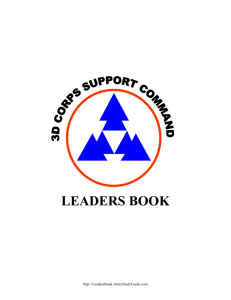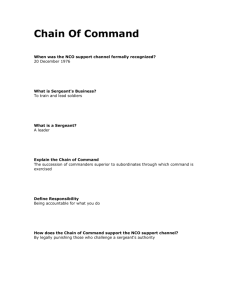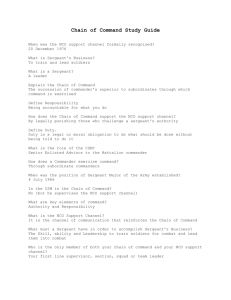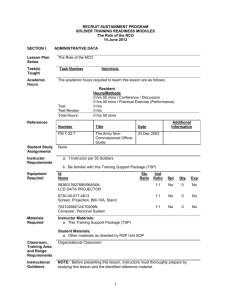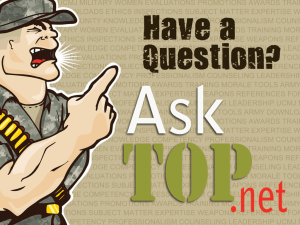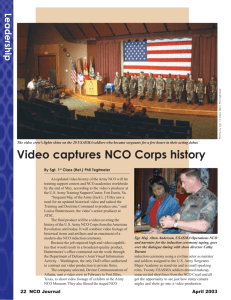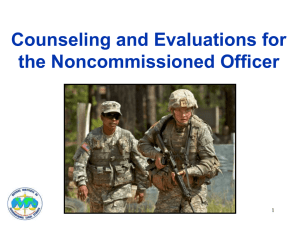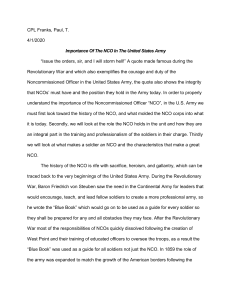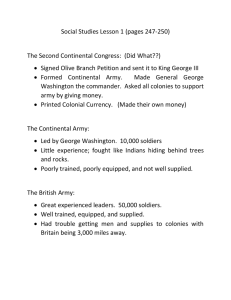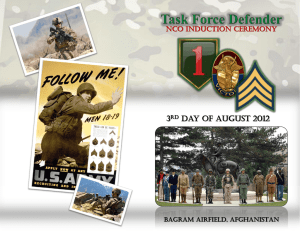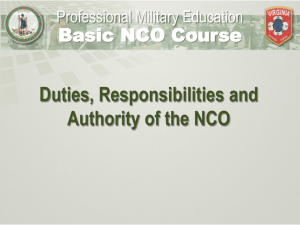ANCOC Graduation - Squad
advertisement
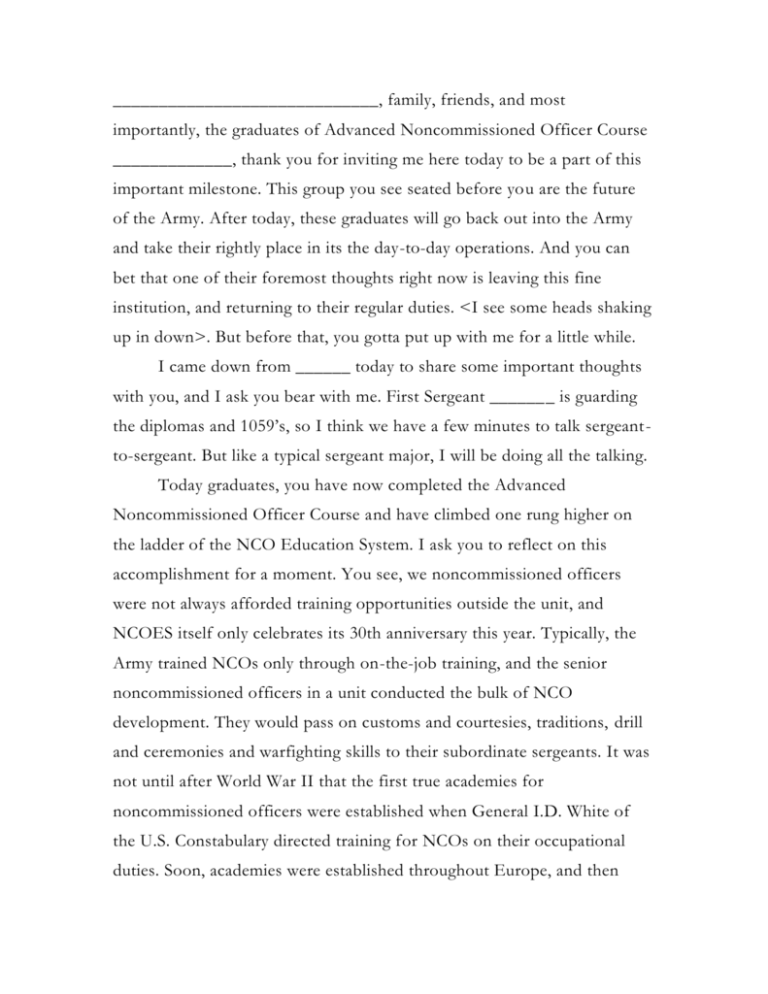
_____________________________, family, friends, and most importantly, the graduates of Advanced Noncommissioned Officer Course _____________, thank you for inviting me here today to be a part of this important milestone. This group you see seated before you are the future of the Army. After today, these graduates will go back out into the Army and take their rightly place in its the day-to-day operations. And you can bet that one of their foremost thoughts right now is leaving this fine institution, and returning to their regular duties. <I see some heads shaking up in down>. But before that, you gotta put up with me for a little while. I came down from ______ today to share some important thoughts with you, and I ask you bear with me. First Sergeant _______ is guarding the diplomas and 1059’s, so I think we have a few minutes to talk sergeantto-sergeant. But like a typical sergeant major, I will be doing all the talking. Today graduates, you have now completed the Advanced Noncommissioned Officer Course and have climbed one rung higher on the ladder of the NCO Education System. I ask you to reflect on this accomplishment for a moment. You see, we noncommissioned officers were not always afforded training opportunities outside the unit, and NCOES itself only celebrates its 30th anniversary this year. Typically, the Army trained NCOs only through on-the-job training, and the senior noncommissioned officers in a unit conducted the bulk of NCO development. They would pass on customs and courtesies, traditions, drill and ceremonies and warfighting skills to their subordinate sergeants. It was not until after World War II that the first true academies for noncommissioned officers were established when General I.D. White of the U.S. Constabulary directed training for NCOs on their occupational duties. Soon, academies were established throughout Europe, and then spread to the U.S. But each school had it’s own unique curriculum, and it would not be until 1957 before the Army attempted to standardize the academies. It took the war in Vietnam for the Army to realize that the time it took to develop a professional NCO was not keeping pace with the need within the theater of war. The NCO Corps was face with serving multiple combat tours and its number were being depleted. In response, the Army developed the predecessor to NCOES, the Noncommissioned Officer Candidate Course. This program selected the best and the brightest graduates of Basic Training, and sent them through up to 22 weeks of training on the skills they would need to use as squad leaders in Vietnam. At the same time, the Army Chief of Staff, General Johnson, directed that a comprehensive study of the enlisted grade structure be conducted. One of the facts noted in the study was that there was no integrated, comprehensive system for the progressive professional educational development of individual enlisted careerists. It went on to recommend that the NCO force be reestablished through education, and in 1969 the Chief of Staff approved the Noncommissioned Officer Education System, and by May 1971, the first courses began. For almost 28 years, entire generations of NCOs have come before you, and now I challenge each of you to uphold their honor. But today, I don’t just want to talk about the past, but to also foc us on our future. Just 18 months ago, at the request of the Sergeant Major of the Army, a group on senior NCOs were brought together to help decide the future of our Corps. The objective of this workshop was to assess how we develop NCOs and ensure that it can meet the demands of the future. Among other things that came out of the workshop was the development of the Future NCO Vision. This vision may seem obvious to us, but to many others it clearly defines our role now, and in to the next millennium. The vision states that we are “An NCO Corps grounded in heritage, values and tradition, that embodies the warrior ethos; values perpetual learning; and is capable of leading, training, and motivating soldiers. We must always be an NCO Corp that: Leads by Example; Trains from Experience; Maintains and Enforces Standards; Takes Care of Soldiers; and Adapts to a Changing World. This vision, graduates, should be your compass for our future. I just shared with you one example of the heritage from which our NCO Corp was built, and that was the development of our formal education system. Another element of the Future NCO Vision defines that our values systems should mirror the expectations our Army has for us, and is defined by our seven core values, Loyalty, Duty, Respect, Selfless Service, Honor, Integrity and Personal Courage. For many, it may seem obvious of what types of values are expected of a professional NCO. I have even heard some to question the need for "values" cards. But I am here to tell you our leaders have done us a favor. And that is by defining and publishing a standard. Isn't that what we are charged to do, maintain and enforce standards? In my opinion, these cards and I.D. tags are not as important as the message that a clear standard has been established. And I know we are the standards bearers for the Army's values. Today graduates, as you return to your units and new assignments, you will take with you knowledge…and knowledge is power. The skills learned here at this institution will enable you to share experiences with your peers and subordinates alike. NCO Academies and institutional training are but one of the three pillars of the Army's leader development system. The pillar of self-development is the way to begin perpetual learning. To be able to attain experience, we must continue to develop ourselves. Graduation should not mean we loose our student status, but consider it changing classrooms. The tasks remain the same, only with different conditions. We must master our trade, whatever that may be, and the schoolhouse is unable to train soldiers on more than the critical tasks that we will be faced with. One of our primary roles is to train our soldiers, so we must be fully equipped with the knowledge necessary for the task. It is up to you to continue the learning. Our vision also reminds us of our time-honored tradition of leading by example. As a group, Noncommissioned officers have always led by example. That is one of the first indications we see in a young soldier that they have the potential to enter the ranks of our Corps, leadership. And the example we set for those around us is like wearing your resume on your forehead. We must set clear and attainable standards for our squads, teams and platoons, and we must not only enforce them, but to live them ourselves. The last part of the vision I want to discuss today is one of our primary missions, and that is taking care of soldiers. As you know, taking care of soldiers is not babying or codling them, but ensuring that they are trained, equipped and prepared to do their wartime mission. I once had a wise commander tell a group of us too never except the first five "NO's" when it comes to taking care of soldiers. He went on to explain it like this "if one of your soldiers has a pay problem and they cannot get it corrected themselves, get involved and assist because you know the system. If you go to PAC or S-1 and they cannot fix it, that is one NO. Don't stop there. Make an appointment and go to finance. If the finance clerk cannot help, that is the second NO. The finance clerk has a boss, so that is your next step. If you get a NO again, the boss has a supervisor too. Usually by the time you get to the fifth level, the problem is solved, or it may be a system problem or you are talking to the wrong people." The bottom line is that you sometimes have to get past the people who say NO to find someone who will say YES. Don't give up when it comes to soldiers. And remember the NCO Support channel is also available to assist. As Sergeants First Class, you will likely find yourself serving, if you have not already, as platoon sergeants. Your role will not only be to assist the platoon leader, but to train and mentor the squad leaders within your charge. The squad and team leaders have probably the most important jobs in our Army. It may seem strange that we give this awesome responsibility to the most junior NCOs, those who shoulder the burden of our day-today mission of running our organizations. They deal with soldiers daily, trying to figure out how to accomplish their mission in light of dwindling resources, change, and conflicting priorities. We owe it to them, our Corps, and to those soldiers, that we assist them in being the best leaders they can. I think natural born leaders are a rare breed in this world, so we all need to develop our own leadership styles. But just like the players on a football team have a coach to turn to help call the plays, the platoon sergeant is the coach for the squad leader. I use coach instead of train for a reason, a nd that is because to coach is to train. My handy-dandy dictionary uses other words for coach like teach, prepare, drill, tutor and instruct. We have to do each and every one of those because we are in some ways like a ball team, preparing for the day when we are called in to the game. Yet our successes will not be scored with points or how far we move a ball, but our victory on the battlefield. We know all to well that our super bowl is to fight and win our nations wars. Now before we get on with the part of this ceremony these graduates have been waiting many long weeks for, let me share one more thought with you all. I did not come here today with the intent to remind you of things you already know. I hope to have been able to give you my perspective of where we have come from and where we are going. It is now up to each and every one of you on how we are going to get there. Thank you, and congratulations.
